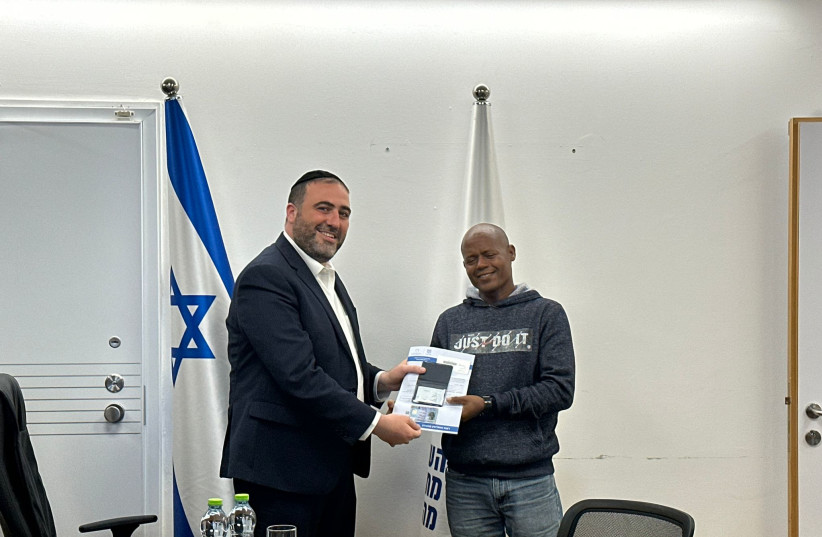Israel’s Interior Minister, Moshe Arbel, has granted Israeli residency to an Eritrean native for his heroic act during the surprising Hamas attack on October 7.
Mulugeta Tsagi, an Eritrean citizen, risked his life to save an injured IDF officer, known as Lt. Col ‘Y,’ who was shot by Hamas terrorists invading Sderot, a western Negev city and former development town in the Southern District of Israel.
Shortly after being shot, Lt. Col ‘Y’ regained consciousness to find Tsagai attending to him, stopping the bleeding and offering reassurance, saying, “I’m with you until the end,” according to the Jerusalem Post.
Despite ongoing danger from passing terrorists, Tsagai remained by the officer’s side for two hours until another citizen rescued them and transported them to a hospital.
Following his recovery, Lt. Col ‘Y’ expressed his desire to thank the individual who saved his life and sought assistance from the Minister of the Interior to help Tsagai secure his status in Israel.

Moved by the story, Minister Arbel granted Tsagai legal residency in Israel, stating, “The seventh of October was a catastrophe that affected the whole country. The least that can be done to show gratitude to someone who risked his life to save the life of an IDF officer is to grant him the opportunity to live here with dignity.”
Minister Arbel described the decision as a “thank you” for Tsagi’s courageous actions on that day. Arbel further emphasized the importance of gratitude, citing it as the highest Jewish value.
This act of granting residency stands in contrast to Israel’s broader refugee situation, with around 30,000 refugees, mainly from Eritrea or Sudan, seeking asylum.
However, less than 1% of these refugees are officially recognized by the state of Israel, resulting in one of the most minimal rates of refugee acceptance among Western nations.
Israel’s Stringent Measures Against Asylum-Seekers
The nation of Israel has implemented a series of stringent measures against certain groups, restricting their right to seek protection and raising concerns about the potential for mass unlawful detention of asylum seekers.
Israel currently hosts approximately 25,000 asylum seekers from Africa, including around 18,000 from Eritrea and more than 3,000 from Sudan.
Eritreans and Sudanese in Israel face challenges in obtaining protection, as Israel’s asylum system, deemed unfair by human rights organizations, either prevents or discourages them from filing asylum claims or unfairly dismisses their claims.
Israeli authorities classify them, along with all irregular border-crossers, as “infiltrators,” recognizing fewer than 1 percent of asylum applicants as refugees. In contrast, the European Union boasts acceptance rates of 90 percent for Eritreans and 60 percent for Sudanese.
Israel’s stance on asylum seekers is notably stringent, as it extends recognition to only a tiny fraction, predominantly considering them as economic migrants.
The nation firmly maintains that it has no legal obligation to provide refuge or support to these individuals seeking asylum within its borders.
To compel their departure, the country has employed various tactics, such as transferring some to a remote prison, withholding a portion of their wages until they agree to leave, or offering financial incentives to those willing to relocate to another African country.
Critics contend that the government employs coercive measures to force migrants to depart.
In September 2023, Israeli Prime Minister Benjamin Netanyahu expressed his explicit desire for the prompt deportation of Eritrean refugees and migrants who were implicated in a violent clash in Tel Aviv.
In addition to this specific incident, Netanyahu mandated the formulation of a comprehensive plan aimed at the expulsion of the entire population of African migrants residing in the country.
Furthermore, in the aftermath of Hamas’s surprise attack on October 7, Eritreans who had sought refuge in Israel are experiencing further displacement due to the air strike on southern Israel.

Meanwhile, Israel is gearing up for a substantial surge in Jewish immigration, known as aliyah, in the upcoming year, as recently revealed by Aliyah and Integration Minister Ofir Sofer in a statement published by his ministry.
The Minister disclosed that there has been a notable uptick in individuals considering relocation to Israel, with a striking 149% increase in interest from France and an 81% surge in inquiries from North America.
The heightened interest in immigration comes in the wake of a significant rise in antisemitic incidents globally, notably since the onset of Israel’s conflict with Hamas.
In particular, France has witnessed an unprecedented escalation in antisemitic attacks, surpassing even the peak numbers recorded in 2002 in the past month alone. In response to these trends, Minister Sofer has directed the professionals within his ministry to brace for an anticipated wave of immigrants.
- Contact the author at ashishmichel(at)gmail.com
- Follow EurAsian Times on Google News




